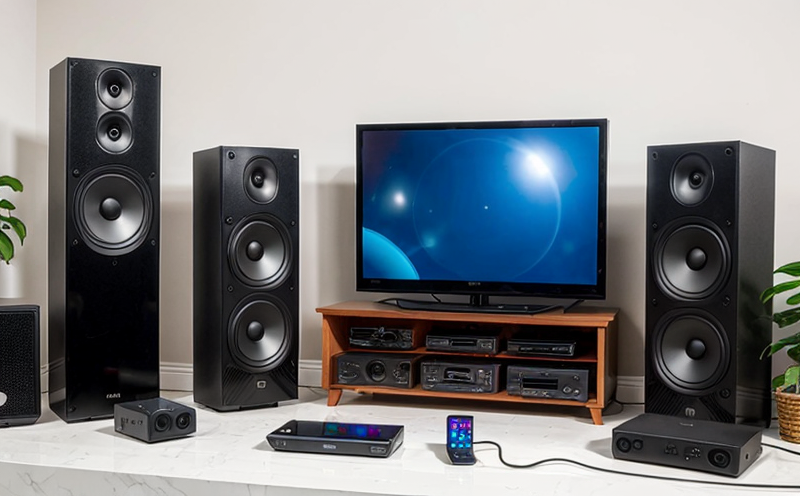SAE J1113 EMC Testing for Automotive Integrated Consumer Electronics
The SAE J1113 standard is a critical benchmark in the field of automotive electronics testing, specifically addressing Electromagnetic Compatibility (EMC). This service ensures that integrated consumer electronics within automobiles are free from electromagnetic interference and can coexist with other devices without causing harmful interference. This compliance is essential for ensuring safe operation and preventing malfunctions due to electromagnetic disturbances.
The SAE J1113 standard was developed by the Society of Automotive Engineers (SAE) and focuses on the electromagnetic compatibility testing of consumer electronics that are integrated into automotive systems. These devices range from infotainment systems, GPS units, navigation systems, and other entertainment and utility features found in modern vehicles.
The testing process involves a series of rigorous procedures designed to ensure that these devices meet stringent electromagnetic interference (EMI) and susceptibility requirements set by the standard. The primary goal is to validate that the electronic components within these integrated consumer electronics function reliably under various environmental conditions, including exposure to electromagnetic fields.
By adhering to SAE J1113, manufacturers can ensure their products are not only compliant with industry standards but also perform optimally in real-world driving scenarios. This compliance is particularly important as the automotive industry increasingly integrates more sophisticated electronics into vehicles. The standard covers a wide range of test parameters and acceptance criteria that must be met to pass EMC testing.
The SAE J1113 EMC Testing for Automotive Integrated Consumer Electronics service encompasses several key aspects:
- Testing procedures for EMI and susceptibility
- Preparation and conditioning of the specimen prior to testing
- Use of appropriate instrumentation during testing
- Compliance with international standards such as ISO, ASTM, EN, IEC
- Data analysis and reporting on test results
The service is designed to cater to quality managers, compliance officers, R&D engineers, and procurement teams who are responsible for ensuring the reliability and safety of integrated consumer electronics in automobiles. By offering this specialized testing, we help clients meet stringent industry standards and ensure their products perform reliably under various environmental conditions.
Scope and Methodology
The scope of SAE J1113 EMC Testing for Automotive Integrated Consumer Electronics is comprehensive. It covers the testing of consumer electronics that are integrated into automotive systems, ensuring they comply with stringent electromagnetic compatibility standards. The methodology involves a series of rigorous procedures designed to validate the performance of these devices under various environmental conditions.
The testing process begins with the preparation and conditioning of the specimen for EMC testing. This includes ensuring the device is in its operational state and free from any external factors that could influence the test results. Once prepared, the device undergoes a series of tests to assess its electromagnetic compatibility. These tests include measuring the emitted and received electromagnetic interference (EMI) signals, as well as assessing the susceptibility of the device to electromagnetic disturbances.
The use of appropriate instrumentation is crucial in this testing process. The equipment used must be capable of accurately measuring the EMI and susceptibility levels of the integrated consumer electronics. This ensures that the test results are reliable and can be used to make informed decisions about the design and manufacturing processes.
After completing the tests, data analysis and reporting on the test results are conducted. This involves analyzing the collected data to determine whether the device meets the specified acceptance criteria set by SAE J1113. The report provides detailed information on the testing process, including any areas where improvements can be made.
Compliance with international standards such as ISO, ASTM, EN, and IEC is essential for ensuring that the results of the EMC testing are recognized worldwide. By adhering to these standards, we ensure that our clients' products meet the highest quality and safety requirements.
International Acceptance and Recognition
The SAE J1113 standard is widely recognized and accepted internationally. Its rigorous testing procedures and acceptance criteria ensure that integrated consumer electronics in automobiles meet the highest standards of electromagnetic compatibility.
SAE International, the organization responsible for developing this standard, collaborates with various national standards bodies to ensure consistency and interoperability across different regions. This collaboration ensures that products tested according to SAE J1113 are recognized and accepted globally.
The acceptance and recognition of SAE J1113 in the automotive industry is a testament to its effectiveness. Many major automotive manufacturers and suppliers rely on this standard for ensuring the reliability and safety of their integrated consumer electronics. By adhering to SAE J1113, companies can ensure that their products meet global standards and are recognized by regulatory bodies worldwide.
The widespread adoption of SAE J1113 reflects its importance in the automotive industry. Its comprehensive testing procedures and acceptance criteria provide a robust framework for ensuring the electromagnetic compatibility of integrated consumer electronics. This standard is essential for maintaining the highest level of reliability and safety in modern automobiles.
Environmental and Sustainability Contributions
Reducing emissions: By ensuring that automotive integrated consumer electronics function reliably under various environmental conditions, SAE J1113 helps prevent malfunctions that could lead to increased fuel consumption or emissions.
Promoting resource efficiency: The standard encourages the design and manufacturing of products that are energy-efficient and have a reduced environmental impact. This contributes to promoting sustainable practices within the automotive industry.
Enhancing durability: Ensuring reliable performance under various conditions helps extend the lifespan of integrated consumer electronics, reducing waste and the need for frequent replacements.





